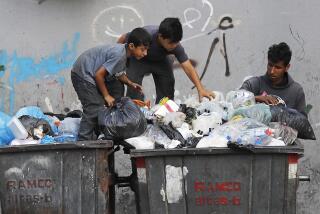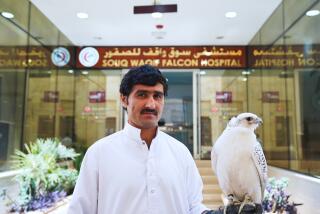COLUMN ONE : Party’s Over, Kuwait Tells Its Citizens : Even a country earning $35 million a day doesn’t have unlimited resources. Talk of taxes and benefit cuts is not popular. Leaders say it’s time for coddled residents to pitch in.
- Share via
KUWAIT CITY — A glitzy new, 511-seat McDonald’s restaurant rests on a rocky outcrop of the Persian Gulf coast here, offering breathtaking views of the blue sea, passing tankers and, lately, American warships.
Unfortunately, though, the guy who lives in the palace across the street is the crown prince of Kuwait. And he doesn’t like his new view.
But not to worry. The dispute is being solved in time-honored Kuwaiti fashion--quietly and with money. The government is buying the 3-month-old McDonald’s building and offering the hamburger chain another site, a few hundred yards down the coast, without charge.
Money and determination have worked wonders in Kuwait since 1991, when half a million American soldiers joined a worldwide coalition to break Iraqi dictator Saddam Hussein’s hold on this small emirate.
Oil wells are pumping again, at a rate of 2 million barrels a day; the environment is steadily improving, and the cradle-to-grave social welfare system still guarantees every Kuwaiti a tax-free income, free medical care and interest-free loans.
But even a country earning $35 million every day for its 600,000 citizens has bills to pay. And the latest crisis with Iraq has Kuwait’s leaders preparing, more seriously than any time since oil was discovered in this desert, to force their coddled citizenry to help pay the tab.
“Everyone is going to have to pitch in here,” said Saud al Sabah, minister of information, member of the royal family and former ambassador to the United States. “We’re tightening our belt. And it’s the responsibility of all of us.”
Kuwait’s $30-billion share of the costs of the Gulf War, along with the $30 billion it spent to extinguish the oil fires and rebuild, have taken their toll, at least on paper. Kuwait also has committed $3.5 billion to expanding its own military and promised to pay as much as half of the at least $500-million tab run up by the international rush to defend it in the current crisis.
No one here questions defense spending, especially in light of the threat posed by Hussein. “Money can always be recovered and made up,” Saud said in an interview. “But once you lose your country, you have nothing. We’ve fully committed our financial resources to this whole operation.”
But many Kuwaitis, still nursing their personal financial wounds from the war, are wary of the talk of “fees” and even “taxes” emanating from the palaces where the country’s rulers live.
“It’s illogical to impose fees,” said Ghannam Jamhour, an opposition member of Parliament, “particularly in a country where the citizens see national funds flowing out of the country in loans and grants to other countries in the world.”
Kuwait spends considerable sums on development aid, mostly in the non-oil-producing Arab world.
Make no mistake: Kuwait is not poor, not by any measure.
Although war and reconstruction costs have forced it to draw down its foreign investments by 50%, the oil in the ground and the emirate’s remaining investments, worth $60 billion, have made it easy to obtain loans at friendly interest rates.
But Kuwaitis are spending too much, and the government, which employs 92% of adult Kuwaitis, is running an annual deficit of $6 billion, large enough to be worrying.
The reasons are obvious: Every Kuwaiti is constitutionally guaranteed a job, free medical care and free education. Their air-conditioned houses have the lowest utility bills in the world. A telephone costs $100 a year, with free local calls. And no one pays income or sales taxes.
Newlyweds can get a free new home from the government simply by applying, though there is a waiting list. If they prefer, Kuwaitis can receive free land and a $210,000, interest-free, 60-year loan to build their own house.
At the end of the Gulf War in 1991, to bolster morale in the besieged emirate and help people get back on their feet, Kuwait’s ruling family forgave all loans for everything from houses to Mercedes-Benz cars.
The social cushion already is enormous, and, with half of Kuwait’s population younger than 18, the drain on the country’s resources is likely to grow rapidly in coming years. So the government is searching for places to cut.
A few months ago, it suggested minimal fees for some medical services but dropped the idea in the face of loud objections. Now the government is considering other alternatives, including charging for local telephone calls, imposing a trial wage tax or increasing the duty on luxury goods. Those higher duties seem likely soon.
“We’re talking about luxuries, not necessities,” Saud said. “Like Mercedes-Benzes and Rolls-Royces. You pay just 4% now. That’s ridiculously low.”
Besides raising money, he said, the government needs to “seriously think” about cutting its own spending--or at least redirecting it.
Government departments and state-run businesses now are bloated with people, many of whom do little more than occupy a desk and chair during the six-hour workday. The more ambitious have businesses of their own, which they tend during their substantial free time.
And yet the country’s army, air force and police are seriously understaffed, reflecting, some say, the reluctance of Kuwaitis to get their hands dirty in real work.
The new McDonald’s, owned by a Kuwaiti entrepreneur, has a staff of 170 with 20 managers--all hired and trained in Manila. And most houses have a full-time Indian or Philippine maid, who gets paid, on average, $100 a month.
In a joke making the rounds among foreigners here, a Kuwaiti man is asked whether making love is work or pleasure. “It must be pleasure,” he says, “because if it was work I’d get an Indian to do it.”
In fact, Kuwaitis are a minority in their own country, accounting for just one-third of the 1.6 million people here. And they have long relied heavily on imported labor--from Egypt, India, Sri Lanka and the Philippines--to do everything from manage businesses to clean houses.
Those foreigners, though, are not exactly welcomed with open arms. The law prohibits non-Kuwaitis from owning property or having a majority share in any company in the country.
“We’re all in the same boat,” said Wilson Mangally, an Indian who works as a middle manager for a car rental company here. “And the Kuwaitis think they can buy anything with money.”
The government has tried before, without success, to get Kuwaitis to pay some of their own way.
But this time, diplomats say, it may work.
“Back in the 1970s, they were literally looking for ways to spend money here,” a Western diplomat said. “But now, with the threat of Saddam across the border, they are beginning to understand that the government pockets aren’t bottomless.”
Another reason such change may be more welcome is the significant move toward democracy in the country. Although the government, run by the ruling Al Sabah family, still has the last say, it listens more these days to its opponents in Parliament. And criticism of the royal family, though not the emir, is daily fare in the newspapers.
“The royal family still has the ultimate power,” said Dr. Jasem Hajia, a U.S.-trained psychiatrist in Kuwait City. “Some don’t like it, but most of us are used to this kind of rule. They aren’t that bad.”
Since the Gulf War, a kind of social contract has been forged between the rulers and citizens in Kuwait. For its part, the government does its best to keep the oil machine running and build up the country’s defense alliances; citizens agree to allow the ruling family to stay in power.
In many ways, this is a more politically stable country now than before the war.
Democratic reforms have been slowly, but steadily, implemented. Although one analyst says it will be 30 years before the vote is extended to women, the government recently added sons of naturalized Kuwaitis to the voting rolls, increasing the country’s electorate from 80,000 to about 100,000.
Perhaps more important, the threat from Iraq has helped pull the nation together.
The only problem is, of course, money.
Kuwaitis like to spend it, taking yearly or twice-yearly vacations to faraway spots, buying expensive cars and all manner of electronic gadgetry. At the shopping malls and on the streets, pagers and telephones sound from the deep pockets of Kuwaitis’ white dishdashas.
Asked why he carries a pager, Issa Aljadi, a 24-year-old engineer at the national oil company, said: “I don’t know. In case my mother wants to reach me, I guess.”
But the free-spending days may be numbered here.
“There’s less money--it’s a fact,” said Jassim M. Hassan, a biochemist at Kuwait University. “It’s a new thing. Before, no one would have dared suggest that we pay any government taxes.
“By nature, we Kuwaitis are not the kind of people who keep money and save money,” he added. “We like to enjoy life. But you can’t do what you did before. We’ll all have to contribute now, and that’s a positive thing. We are shaping up.”
Foreign diplomats say that fewer than 10% of Kuwaitis are hard-working entrepreneurs and that most of those are experts in finance. Many of the rest avoid difficult jobs and are content to live on what the government gives them.
The 20-year-old social network, which one diplomat describes as “beyond Sweden,” has, indeed, spawned a feeling of relaxation, if not laziness, among the population.
“People are just spoiled,” said Badir Refai, an oil company executive with two Mercedes-Benzes in his garage. “They don’t want to pay for electricity or water. And they take so much medicine home from the clinics that they have to throw them in the garbage. Why shouldn’t we pay?”
The world stereotype of slothful Kuwaitis angers many here, though.
“There is a feeling in the world that we don’t deserve what we have,” said Saif Abbas Abdulla, 52, chairman of the political science department at Kuwait University. “But we are not living like kings. We are not even living like prime ministers. It is a reasonably comfortable life. And we know how to utilize our money.”
More to Read
Sign up for Essential California
The most important California stories and recommendations in your inbox every morning.
You may occasionally receive promotional content from the Los Angeles Times.











